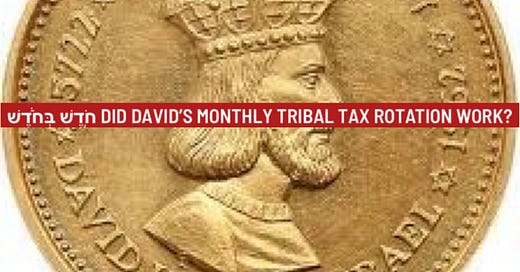Taxes: Always a hot topic of debate and dispute and yet rarely understood. What if it worked in a totaly different system than how most of us imagine?
The Book of Chronicles describes in today’s chapter what the tribal tax system looked like under King David - and it is a unique and intriguing way to make sure the kingdom functions. Whether it was how it worked, and whether it was lucrative - or just this book’s attempt to glorify the founder once more - we won’t know.
But it’s not just about income - as often in these pages, these dry, dull lists include important historical information, hidden between names and numbers, with clues about power, justice, and what it means to belong.
You have to sort these numbers out to make sense of the narratives these lists reveal:
וּבְנֵ֣י יִשְׂרָאֵ֣ל ׀ לְֽמִסְפָּרָ֡ם רָאשֵׁ֣י הָאָב֣וֹת וְשָׂרֵ֣י הָאֲלָפִ֣ים ׀ וְהַמֵּא֡וֹת וְשֹׁטְרֵיהֶם֩ הַמְשָׁרְתִ֨ים אֶת־הַמֶּ֜לֶךְ לְכֹ֣ל ׀ דְּבַ֣ר הַֽמַּחְלְק֗וֹת הַבָּאָ֤ה וְהַיֹּצֵאת֙ חֹ֣דֶשׁ בְּחֹ֔דֶשׁ לְכֹ֖ל חׇדְשֵׁ֣י הַשָּׁנָ֑ה הַֽמַּחֲלֹ֙קֶת֙ הָאַחַ֔ת עֶשְׂרִ֥ים וְאַרְבָּעָ֖ה אָֽלֶף׃
The number of Israelites—chiefs of clans, officers of thousands and hundreds and their clerks, who served the king in all matters of the divisions, who worked in monthly shifts during all the months of the year—each division - was 24,000
I Chronicles.27.1
.
Notice the monthly shifts? Each of the twelve tribes took responsibility for one month of the year. During that month, they provided the needed humanpower—likely for both military and administrative service. Each tribe had a designated officer who collected the dues and ran the show. They are each named here - 24,000 total tax team members.
Was that a good system?
There were no tax brackets. No differentiation between rich and poor. No accounting for tribe size. Each tribe paid the same, regardless of population or internal inequalities. Equality? Or a flattening of difference in the name of national unity? An imagined scenario that has no facts or proof to back up its actual use?
Most scholars read this not as an actual economic policy but as an idealized vision—a carefully crafted image by the Chronicler - writing centuries later, with an idealized agenda of glorifying the past -- to promote a strong, unified Davidic state. We know from archaeology and comparative ancient Near Eastern studies that real tax systems in Mesopotamia or Egypt were more complex, often proportional to population or land ownership. This biblical version—12 tribes, 12 months, flat rate—is orderly, symbolic, and serves a larger point: The Judean kingdom, guided by God, under David’s line, functions like a cosmic calendar:
Everyone knows their time. Everyone has their turn. Don't complain. Pay up. Shut up. On one hand, Chronicles offers a beautiful vision: shared responsibility, sacred order, and national rhythm. On the other hand, it papered over real inequalities with the language of unity and divine right. The tribe of Naphtali with 30,000 people pays the same as Judah with 70,000? How is that just?
In fact, Chronicles goes out of its way to warn against anyone who might object. “Do not count the people!” is the implicit message—remember what happened last time a census was taken? Plague. Punishment. The subtext is clear: don’t question the math, just trust the system.
It didn’t work out. The Kingdom of Solomon crumbled as soon as he died - partially because of the people’s revolt against endless taxes and national tasks. At some point this ideal system favored some and hurt the weaker - as so many systems still do.
Today we still wrestle with versions of this question. Who pays how much? How do we divide the wealth and share responsibilities? Who gets exemptions? How do we make sure everyone carries their fair share—and define what "fair" even means? Whether it's progressive taxation, flat tax debates, or cries about “inequity in the burden,” the biblical echo reminds us that these critical questions are always at the heated heart of the social order and its discontent.
Behind every tax system is a story we tell ourselves about what we value, who we are and what we owe each other.
And maybe—just maybe—Chronicles is less a record of what was, and more a dream of what could be: a nation not fragmented by class or tribe or status, but rotating together through responsibility and rest, united by visions of value and shared goals that will benefit all? Can’t hurt to dream. That’s how most empires and nations are built - and when the dream becomes a nightmare that’s also how they fall apart or torn. Fact or fiction, this tax system reminds us not to give up on the dream.
Below the Bible Belt: 929 chapters, 42 months, daily reflections.
Become a free or paid subscriber and join Rabbi Amichai’s 3+ years interactive online quest to question, queer + re-read between the lines of the entire Hebrew Bible. Enjoy daily posts, weekly videos and monthly learning sessions. 2022-2025.
Become a Paid Subscriber? Thank you for your support!
#Chronicles #BookofChronicles #IChronicles
#hebrewbible #כתובים #Ketuvim #Bible #Tanach #929 #דבריהימים #labshul #belowthebiblebelt929
#Ichronicles27
#taxes #nomoretaxes #biblialtaxation ##twelvetribesofisrael #cosmicalendar #equity #utopia #uncovertoughtruth #forcedlabor
#peace #prayforpeace #nomorewar #stopthewarnow




Much needed dream and hope.
And a question: Is it Chronicles that laid the foundation for the redemption of David’s reputation? Is it simply the Davidic unity and power of Judea? What enables people today to paper over his heinous behaviors?
Again, details which I never noticed before. Thank you!